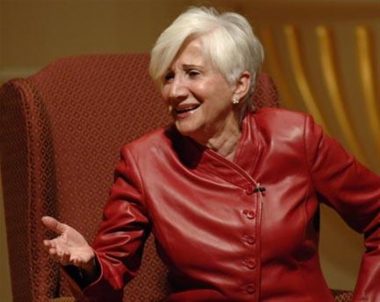The tallest hurdle in her storied career was overcoming her own name. For Academy Award-winning actress Olympia Dukakis, a Greek heritage limited early opportunities to audition for theater productions in the 1950s and 60s. Her lesson to current Elon students: “Take total and full responsibility for yourself. You want to work? Figure out a way to do it. … Just don't wait for people to give it to you.”

“Don’t let them tell you who you are. You have to insist on how you’re going to be defined,” she said of working with directors. “If you didn’t get the part, does that mean you’re not a good actor, that you’re not worthy? You have to keep an eye on that because it’s so undermining.”
The lengthy question-and-answer session allowed Elon students a chance to ask the acclaimed performer a variety of questions:
How has her acting experience affected her directing? “As a director, what you really want to do is tell a story, and you want actors capable of being your colleagues, and doing this with you.”
Why leap from studying physical therapy in college to entertaining audiences on stage? “I got there and I realized there were women and athletes coming from all over the country and realized that while I was good, I wasn’t the best.”
What are some pointers from moments in her career where keeping her passion for acting was difficult? “There were times, of course, when it really waned. It didn’t wane when I failed as an actress. It waned when I failed to get work, when I couldn’t somehow get in there … I’d always thought that when you went to audition that it was about showing how you would play the part and play it better than anyone else … It was amazing how I carried so much of this with me, and how I had to work through a lot of it, so that I could go out there and just be Olympia … If I was shy, then I’d be shy. If I was cocky that day, I’d be cocky.”
But the theme Dukakis touched upon several times was that of defining one’s own image. It was difficult in her early years when directors and producers assumed that because of her name, she spoke with an accent, and they would typecast her for certain parts when she was able to even audition.
“Look at me now. I could be Rosemary Wilson. Pick a name out of someplace. But I couldn’t get the audition because of my name,” Dukakis said. “Now you would think, well, what’s the logical thing? Change your name. And my agent said to change my name. However, I had spent my time growing up in a very volatile neighborhood. There was a lot of fighting in the streets … over our names, the food we ate, our noses. It was like, crazy, but that’s what happened.
“I had fought so many battles over my name. I just couldn’t do it. And that’s one of the things I feel good about, that I kept my name. And now look at all the Greeks out there with these very complicated names. Good, huh? They’re not changing their names.
“If somebody called Olympia Dukakis can get an Oscar, I guess they figured it was OK that they keep their name.”
Dukakis won an Academy Award for Best Supporting Actress for her performance in the 1987 romantic comedy Moonstruck. She also published a highly acclaimed autobiography, Ask Me Again Tomorrow: A Life in Progress, in 2003. Film credits include Steel Magnolias, Look Who’s Talking and Mr. Holland’s Opus.
A cousin of one-time presidential candidate Michael Dukakis, Olympia – who has also acted in, produced, directed and taught theater – today lives in New York City with her husband and acclaimed actor Louis Zorich.
“We are thrilled and honored to have an artist of the caliber and accomplishment of Ms. Dukakis on our campus to interact with our performing arts majors and the campus at large,” associate professor Fred Rubeck, chair of Elon’s Department of Performing Arts, said in early October. “Our students will benefit greatly from the time she spends with us.”
Students said after the question-and-answer night that hearing Dukakis reinforced lessons that professors taught in the classroom.
“One thing I appreciated was hearing her talk about not letting people get in your head,” said Vincenzo Meduri, a freshman performing arts student. “You feel that pressure.”


